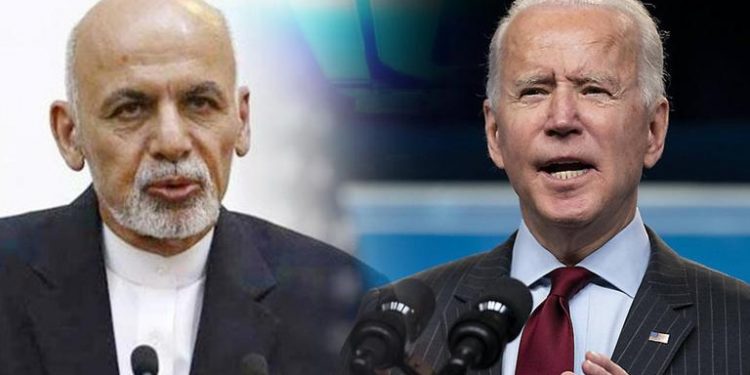Washington: President Joe Biden would meet Afghan President Ashraf Ghani and his chief peacemaker Dr Abdullah Abdullah at the White House Friday for the first face-to-face interaction ahead of the withdrawal of the remaining US and NATO forces from the war-torn country by September 11.
The visit by President Ghani and Dr. Abdullah will highlight the enduring partnership between the United States and Afghanistan as the military drawdown from Afghanistan continues, White House Press Secretary Jen Psaki said Sunday.
“Biden looks forward to welcoming Afghan President Ashraf Ghani and Dr. Abdullah Abdullah, Chairman of the High Council for National Reconciliation, to the White House on June 25,” she said.
The high-level meeting will take place as the Taliban insurgents have in recent weeks captured dozens of new districts in Afghanistan and both sides are said to have suffered heavy casualties.
The escalation in fighting between Afghan security forces and Taliban militants have dealt fresh blows to the US-brokered peace negotiations between Kabul and the insurgents.
The US, Psaki said, is committed to providing diplomatic, economic, and humanitarian assistance to support Afghan people, including Afghan women, girls and minorities.
She said the United States will remain deeply engaged with the government of Afghanistan to ensure the country never again becomes a safe haven for terrorist groups who pose a threat to the US homeland.
“The United States continues to fully support the ongoing peace process and encourages all Afghan parties to participate meaningfully in negotiations to bring an end to the conflict,” Psaki said.
The US military exit from Afghanistan before September 11 stems from the February 2020 agreement Washington signed with the Taliban in return for counterterrorism guarantees and pledges the group would negotiate a political settlement to the war with the Afghan government.
In April, President Biden announced that the US will withdraw all remaining troops from Afghanistan by the 20th anniversary of the September 11 terror attacks, in an effort to end a deadly conflict that has cost trillions of dollars and the lives of more than 2,300 American troops.
Biden has made it clear that a continued military strategy was no longer sustainable in Afghanistan.
“We cannot continue the cycle of extending or expanding our military presence in Afghanistan hoping to create ideal conditions for the withdrawal and expecting a different result,” he said in a major policy speech on April 14 from the Treaty Room of the White House – where former president George W. Bush first informed the nation of US strikes on al-Qaida training camps in Afghanistan in October 2001.
In response to Biden’s announcement, Afghan President Ghani said his country respects his American counterpart’s decision to draw down their troops by September of this year and Kabul will ensure a smooth transition.
Ghani pointed out that the Afghanistan National Defence and Security Forces have been carrying out most of the operations independently since the US-Taliban agreement of February 2020 to defend the people and the country.
“Our forces are capable of defending Afghanistan against current threats,” the Afghan president said in a statement in April.
PTI






































